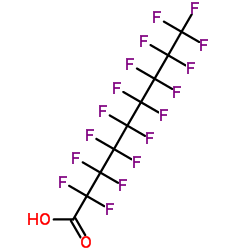Perfluorononanoic acid

Perfluorononanoic acid structure
|
Common Name | Perfluorononanoic acid | ||
|---|---|---|---|---|
| CAS Number | 375-95-1 | Molecular Weight | 464.076 | |
| Density | 1.8±0.1 g/cm3 | Boiling Point | 196.4±35.0 °C at 760 mmHg | |
| Molecular Formula | C9HF17O2 | Melting Point | 59-62 °C(lit.) | |
| MSDS | Chinese USA | Flash Point | 72.6±25.9 °C | |
| Symbol |

GHS07 |
Signal Word | Warning | |
|
Sources and fate of perfluorinated compounds in the aqueous environment and in drinking water of a highly urbanized and industrialized area in Italy.
J. Hazard. Mater. 282 , 51-60, (2014) Perfluorinated substances are listed among emerging contaminants because they are globally distributed, environmentally persistent, bioaccumulative and potentially harmful. In a three-year monitoring campaign (2010-2013) we investigated the occurrence, source... |
|
|
Determination of perfluorinated alkyl acids in corn, popcorn and popcorn bags before and after cooking by focused ultrasound solid-liquid extraction, liquid chromatography and quadrupole-time of flight mass spectrometry.
J. Chromatogr. A. 1355 , 211-8, (2014) An analytical method is proposed to determine ten perfluorinated alkyl acids (PFAAs) [nine perfluorocarboxylic acids (PFCAs) and perfluorooctane sulfonate (PFOS)] in corn, popcorn and microwave popcorn packaging by focused ultrasound solid-liquid extraction (... |
|
|
Chemometric strategy for untargeted lipidomics: biomarker detection and identification in stressed human placental cells.
Anal. Chim. Acta 854 , 20-33, (2014) A lipidomic study was developed in a human placental choriocarcinoma cell line (JEG-3) exposed to tributyltin (TBT) and to a mixture of perfluorinated chemicals (PFCs). The method was based on the application of multivariate curve resolution-alternating least... |
|
|
Development of an analytical method for the targeted screening and multi-residue quantification of environmental contaminants in urine by liquid chromatography coupled to high resolution mass spectrometry for evaluation of human exposures.
Talanta 146 , 694-706, (2015) The aim of this study was to develop an analytical method and contribute to the assessment of the Exposome. Thus, a targeted analysis of a wide range of contaminants in contact with humans on daily routines in urine was developed. The method focused on a list... |
|
|
Microminipigs as a new experimental animal model for toxicological studies: comparative pharmacokinetics of perfluoroalkyl acids.
J. Appl. Toxicol. 36 , 68-75, (2015) In this study, we evaluated the efficacy of a novel minipig strain, the Microminipig (MMPig), as an animal model for studying the pharmacokinetics of a mixture of 10 perfluoroalkyl acids (PFAAs). After a single oral dose was given, we found that the blood dep... |
|
|
Online background cleanup followed by high-performance liquid chromatography with tandem mass spectrometry for the analysis of perfluorinated compounds in human blood.
J. Sep. Sci. 38(2) , 247-53, (2015) In this study, a novel method for the analysis of perfluorinated compounds in whole blood has been developed and validated. The method was developed by using a conventional reversed-phase C18 column as a trapping column for the elimination of background conta... |
|
|
Environmental contaminants activate human and polar bear (Ursus maritimus) pregnane X receptors (PXR, NR1I2) differently.
Toxicol. Appl. Pharmacol. 284(1) , 54-64, (2015) Many persistent organic pollutants (POPs) accumulate readily in polar bears because of their position as apex predators in Arctic food webs. The pregnane X receptor (PXR, formally NR1I2, here proposed to be named promiscuous xenobiotic receptor) is a xenobiot... |
|
|
Characterization of complex lipid mixtures in contaminant exposed JEG-3 cells using liquid chromatography and high-resolution mass spectrometry.
Environ. Sci. Pollut. Res. Int. 21(20) , 11907-16, (2014) The aim of this study was to develop a method based on ultra high performance liquid chromatography coupled with mass spectrometry (UHPLC-MS) for lipid profiling in human placental choriocarcinoma (JEG-3) cells. Lipids were solid-liquid extracted from JEG-3 c... |
|
|
Spatiotemporal distribution and mass loadings of perfluoroalkyl substances in the Yangtze River of China.
Sci. Total Environ. 493 , 580-7, (2014) A systematic investigation into contamination profiles of eighteen perfluoroalkyl substances (PFASs) in both surface water and sediments of Yangtze River was carried out by using high performance liquid chromatography-tandem mass spectrometry (HPLC-MS/MS) in ... |
|
|
Reversible and irreversible sorption of perfluorinated compounds (PFCs) by sediments of an urban reservoir.
Chemosphere 144 , 1747-53, (2015) Uncertainty about the extent to which contaminant sorption by suspended solids and bed sediments is irreversible is a major impediment for modeling and managing the water quality of surface water resources. This study examined reversible and irreversible sorp... |